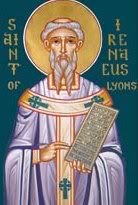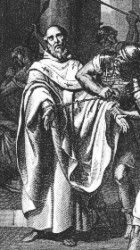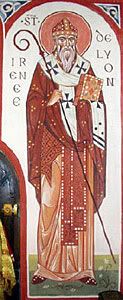Saint Irenaeus was born to Christian parents in Asia Minor. He was placed under the tutelage of Saint Polycarp, Bishop of Smyrna, at an early age, where he was trained in Greek and Latin. Saint Irenaeus modeled his daily practices after those of the venerable bishop, praying, meditating, and engaging in various acts of penance and mortification. From an early age, Irenaeus demonstrated considerable piety and sanctity, as well as a deep aptitude for theological, philosophical, and scholarly pursuits. He befriended and became expert in the beliefs of various pagan and heretical sects, later using his knowledge to discredit their teachings and beliefs.
After years combating the Gnostics—a heretical sect—in Asia, Saint Polycarp sent Irenaeus to Gaul to address the same philosophy which was spreading there. Together with the Bishop of Lyons, Saint Pothinus, Irenaeus valiantly fought to preserve the truth of the Church, many times encouraging the wrath of his opponents, and exposing himself to threats of violence and martyrdom.
After Irenaeus had spent a number of years in combat against the eastern Gnostics and philosophers of error, Saint Polycarp determined to send him to Gaul, where many of the heretics of Asia Minor had already migrated to pursue the Catholic religion, which was beginning to find roots there. With a company of about forty Christians, the valiant soldier of Christ ascended the Rhone to Lyons to rejoin and aid Saint Pothinus, its bishop. Saint Pothinus was already advanced in age, and his church’s neophytes could not always distinguish truth from the Gnostic aberrations. Saint Pothinus received the apostles with joy and soon ordained Saint Irenaeus. Following the martyr’s death of Saint Pothinus, Irenaeus became the second Bishop of Lyons, where he continued to address the teachings of the Gnostics.
The Gnostics proclaimed access to “secret knowledge” imparted by Jesus to a few of His direct disciples—and their teachings were confusing and disruptive to many Catholics of the time. Saint Irenaeus directly addressed these teachings with logic and Scripture, writing a five volume text entitled, “Against the Heresies.” From that text:
“The glory of God gives life; those who see God receive life. Men will therefore see God if they are to live; through the vision of God they become immortal and attain to God himself. God is the source of all activity throughout creation. He cannot be seen or described in his own nature and in all his greatness by any of his creatures. Yet he is certainly not unknown. Through his Word the whole creation learns that there is one God the Father, who holds all things together and gives them their being. As it is written in the Gospel, “No man has ever seen God, except the only-begotten Son, who is in the bosom of the Father; he has revealed him.” From the beginning the Son is the one who teacher us about the Father; he is with the Father from the beginning. The Word revealed God to men and presented men to God. Life in man is the glory of God; the life of man is the vision of God. If the revelation of God through creation gives life to all who live upon the earth, much more does the manifestation of the Father through the Word give life to those who see God.”
Earning his title of Doctor of the Church, Saint Irenaeus wrote many additional works, in explanation of the Faith. Along with his writings, he was a gifted preacher, who by all reports, converted the entirety of the country in short order. The Christians of Lyons became models by their candor, their estrangement from all ambition, their poverty, chastity and temperance, and in this way confounded many adversaries of their religion.
Eventually, due to his fearless preaching of the truth, Saint Irenaeus was martyred in Lyons, with many others, under the Emperor Septimus Severus. He was approximately 80 years old at the time of his death. On order from the Emperor, all Christians were put to death, unless willing to offer sacrifice to the gods. Of course, Saint Irenaeus adamantly refused. Assassins armed with daggers, stones and knives filled the city with blood, and thousands of Christians were killed alongside their courageous bishop, martyrs for the faith. The bodily remains of Saint Irenaeus were buried in the church of Saint John, later renamed for Saint Irenaeus himself. However, his tomb and shrine were destroyed in the sixteenth century, with all earthly traces of the saint lost forever. His writings remain, and continue to inspire us to faithfulness to the truth.
Saint Irenaeus wrote, “For this is why the Word became man, and the Son of God became the Son of man: so that man, by entering into communion with the Word and thus receiving divine sonship, might become a son of God.” Throughout his life, he worked tirelessly to uphold the truth of our faith, during the most difficult times. When we consider his sacrifice, we truly see that the early Church was built by the blood of the martyrs. What are we willing to sacrifice for the Church of God on earth? What extraordinary things are we capable of, filled with the conviction of Christ?
Saint Irenaeus on the one, true, Catholic and Apostolic Church:
“The Church, which has spread everywhere, even to the ends of the earth, received the faith from the apostles and their disciples. By faith, we believe in one God, the almighty Father who made heaven and earth and the sea and all that is in them. We believe in one Lord Jesus Christ, the Son of God, who became man for our salvation. And we believe in the Holy Spirit who through the prophets foretold God’s plan: the coming of our beloved Lord Jesus Christ, his birth from the Virgin, his passion, his resurrection from the dead, his ascension into heaven, and his final coming from heaven in the glory of his Father, to recapitulate all things and to raise all men from the dead, so that, by the decree of his invisible Father, he may make a just judgment in all things and so that every knee should bow in heaven and on earth and under the earth to Jesus Christ our Lord and our God, our Savior and our King, and every tongue confess him.
The faith and the tradition of the churches founded in Germany are no different from those founded among the Spanish and the Celts, in the East, in Egypt, in Libya and elsewhere in the Mediterranean world. Just as God’s creature, the sun, is one and the same the world over, so also does the Church’s preaching shine everywhere to enlighten all men who want to come to a knowledge of the truth.
Now of those who speak with authority in the churches, no preacher however forceful will utter anything different - for no one is above the Master - nor will a less forceful preacher diminish what has been handed down. Since our faith is everywhere the same, no one who can say more augments it, nor can anyone who says less diminish it.”
 Almighty God, who upheld your servant Irenaeus with strength to maintain the truth against every blast of vain doctrine: Keep us, we pray, steadfast in your true religion, that in constancy and peace we may walk in the way that leads to eternal life; through Jesus Christ our Lord, who lives and reigns with you and the Holy Spirit, one God, for ever and ever. Amen.
Almighty God, who upheld your servant Irenaeus with strength to maintain the truth against every blast of vain doctrine: Keep us, we pray, steadfast in your true religion, that in constancy and peace we may walk in the way that leads to eternal life; through Jesus Christ our Lord, who lives and reigns with you and the Holy Spirit, one God, for ever and ever. Amen.Inspired by the origins and spiritual history of the Holy Rosary, we continue our meditation on the psalms, one each day, in order, for 150 days.
Today’s Psalm: Psalm 64: Treacherous Conspirators Punished by God
1 Hear me, O God, as I voice my complaint;
protect my life from the threat of the enemy.
2 Hide me from the conspiracy of the wicked,
from that noisy crowd of evildoers.
3 They sharpen their tongues like swords
and aim their words like deadly arrows.
4 They shoot from ambush at the innocent man;
they shoot at him suddenly, without fear.
5 They encourage each other in evil plans,
they talk about hiding their snares;
they say, "Who will see them?"
6 They plot injustice and say,
"We have devised a perfect plan!"
Surely the mind and heart of man are cunning.
7 But God will shoot them with arrows;
suddenly they will be struck down.
8 He will turn their own tongues against them
and bring them to ruin;
all who see them will shake their heads in scorn.
9 All mankind will fear;
they will proclaim the works of God
and ponder what he has done.
10 Let the righteous rejoice in the LORD
and take refuge in him;
let all the upright in heart praise him!
Day 179 of 365
Prayer Intentions: Confidence and courage in the truth of the Lord, the teachings of the Church; For those persecuted for their beliefs.
Requested Intentions: For a recovery and sanctification (X); For a daughter struggling with disease and illness (T); For all lost children (I); Prosperity, health, healing, and conversion for a family (M); Health and healing of a mother (A); Healing of heart and mind (T); Healing of a new relationship before marriage (K); Healing of a relationship (T); Eternal rest for the dearly departed, end to financial struggles, successful sale of home, ability to travel on pilgrimage (L); For healing of a stomach illness (L); For the repose of the soul of a sister (C); Vocational security for family, Financial security for daughter beginning college (M); Vocational guidance, courage and strength (I); Health for an ailing nephew (A); Those suffering from depression (J); Successful adoption (S); Healing of a father battling cancer (S).
Psalm: Psalm 64: Treacherous Conspirators Punished by God















0 comments:
Post a Comment
Thanks for leaving a comment. If you wish to submit a prayer request, however, please do so above, using the "Contact" tab.